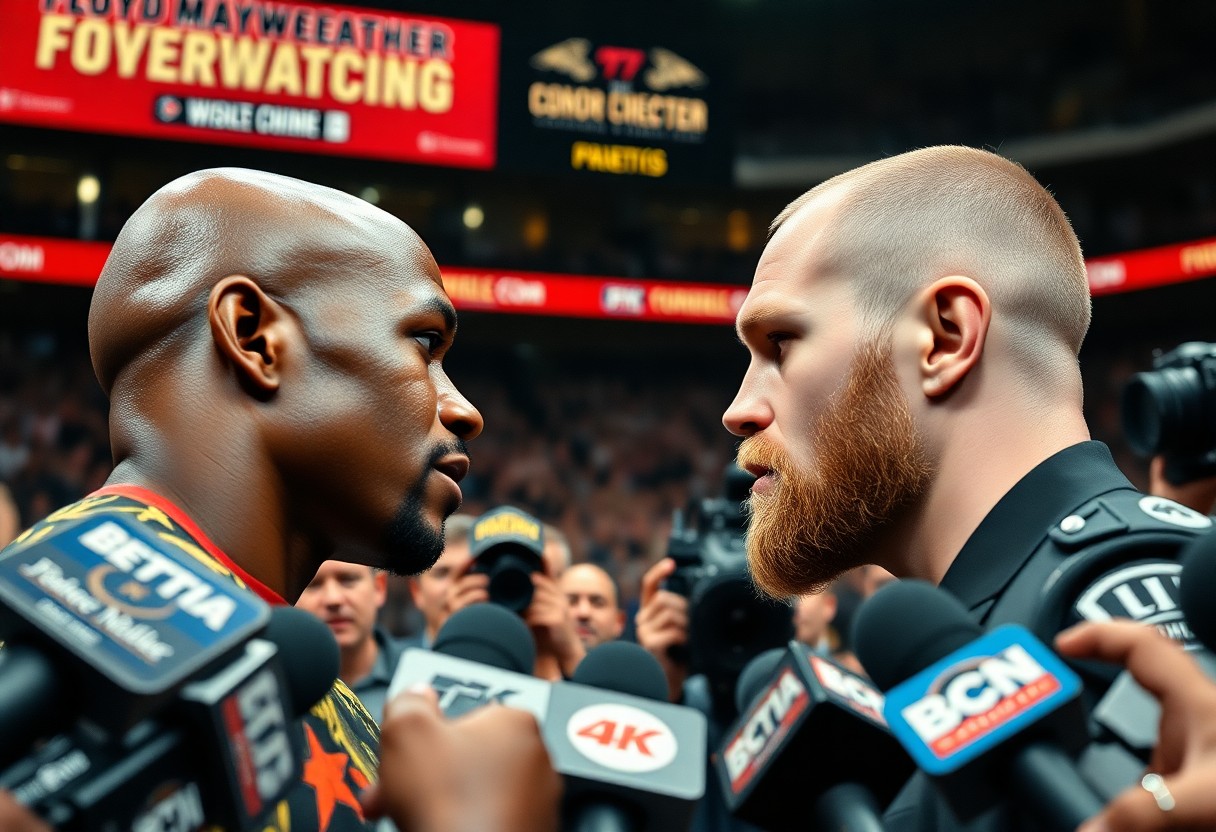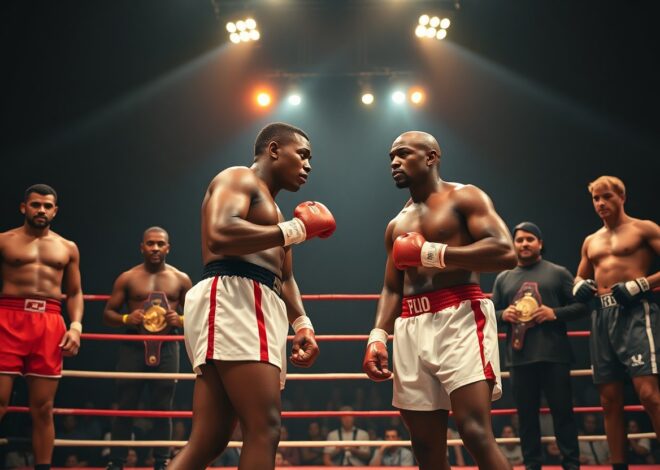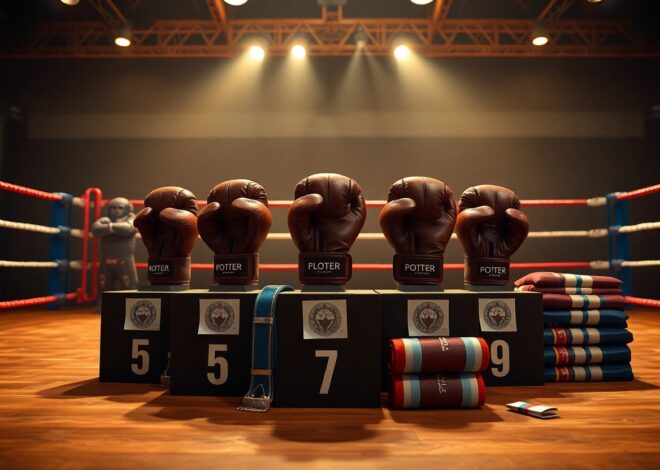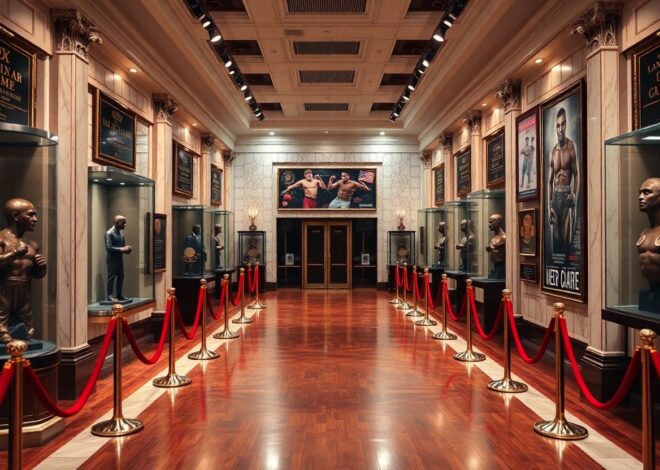
Behind The Trash Talk: The Psychological Warfare Of Floyd Mayweather And Conor McGregor
It’s a striking spectacle how Floyd Mayweather and Conor McGregor used psychological tactics to gain an edge in their highly publicized fight. Both fighters skillfully engaged in trash talk, leveraging it to undermine their opponent’s confidence and assert dominance. This blog post explores the methods they employed, the impact on their mental states, and how this psychological warfare transformed the fight into a broader cultural event. Understanding these dynamics offers valuable insights into the intersection of sports, psychology, and media influence.
The Art of Trash Talk
Both Floyd Mayweather and Conor McGregor excel in the art of trash talk, transforming their bouts into psychological exhibitions. Mayweather’s brash proclamations and McGregor’s razor-sharp wit create an electrifying atmosphere, often overshadowing the physical elements of a fight. This verbal sparring serves not only to entertain but also to unsettle opponents, as they face the challenge of maintaining composure in the midst of relentless provocation.
Psychological Impact on Opponents
The psychological impact of trash talk can be profound, leading opponents to doubt their abilities. McGregor’s sly comments or Mayweather’s boastful confidence can evoke insecurity, triggering a response that detracts from their focus during training and the fight itself. Observers have noted how such verbal tactics can create a mental edge, influencing fight outcomes.
Building Public Personas
Creating a captivating public persona is central to the careers of Mayweather and McGregor. Both fighters utilize trash talk to craft dynamic identities that resonate with fans and generate revenue. Mayweather’s persona revolves around his undefeated record and extravagant lifestyle, while McGregor embodies the brash, charismatic contender who defies expectations. These personas not only boost their marketability but also strengthen their psychological warfare, ensuring opponents face not just a fight but also the weight of a meticulously constructed image.
Floyd Mayweather’s Strategy
Mayweather’s blueprint for success lies in a meticulously crafted strategy that combines psychological manipulation with unmatched boxing skills. By crafting a larger-than-life persona, he not only dominates the ring but also controls the narrative outside it. Drawing opponents into a mental game, he leverages their emotions, creating openings to exploit during fights. His calculated trash talk often serves to unsettle adversaries, leading them to make mistakes in their preparation and performance.
The Money Mayweather Persona
The “Money Mayweather” persona is central to Floyd’s strategy, amplifying his marketability while embodying confidence and success. This image projects wealth and luxury, contrasting with the traditional humility often found in sports. By showcasing extravagant lifestyles, flashy attire, and a relentless work ethic, Mayweather captivates audiences, drawing both admiration and disdain, which fuels the hype surrounding his bouts.
Mental Tactics in Pre-Fight Promotions
Mayweather’s approach to pre-fight promotions is a masterclass in mental strategy. He understands that psychological warfare can shift the balance of power before the first punch. By underlining his dominance through public statements and media appearances, Mayweather seeks to instill doubt in his opponents. This tactic not only rattles them but can also influence betting markets and fan perceptions.
During the notorious press tours leading up to his bout with Conor McGregor, Mayweather employed sharp witticisms and loud proclamations that caught headlines worldwide. His calculated insults were designed to provoke reactions, making McGregor’s frustration visible. Furthermore, Mayweather often reframed narratives, positioning himself as the champion, which ensured that attention remained firmly on him and his prowess. Such meticulously crafted tactics not only build his brand but also unsettle opponents, making them question their own abilities long before the fight begins.
Conor McGregor’s Approach
Conor McGregor approaches psychological warfare with a unique blend of charisma, bravado, and psychological insight, effectively leveraging his public persona to gain an upper hand in both the ring and the media. His strategy hinges on the creation of an icon that is larger than life, drawing in fans and pumping up the hype surrounding his fights. Through self-assurance and calculated theatrics, McGregor’s trash talk often blurs the line between entertainment and intimidation, positioning him as a formidable psychological opponent.
The Mystic Mac Image
The persona of “Mystic Mac” serves as a powerful tool in McGregor’s arsenal, allowing him to redefine expectations through an aura of confidence and prescience. By employing this moniker, he not only invites intrigue but also cultivates expectations that shape the narrative around his fights. The Mystic Mac image creates an almost prophetic quality, as McGregor frequently predicts his victories, adding a layer of psychological pressure on his opponents as they face not just a fighter but a mythic figure.
Utilizing Humor and Insults
McGregor’s arsenal of humor and sharp insults allows him to disarm his opponents, turning the verbal exchange into a game rather than a mere confrontation. His ability to seamlessly blend comedic timing with biting observations often leaves opponents scrambling for a retort. This tactical use of humor not only captivates the audience but also sows seeds of doubt in his opponents’ minds, making them question their composure leading into the fight.
Specific examples of McGregor’s approach include jabs at opponents’ fighting styles, backgrounds, and even personal lives. Remarks like calling out José Aldo as “a little Brazilian who runs away” or mocking Eddie Alvarez’s fighting history expose vulnerabilities while entertaining the crowd. By filtering his insults with humor, he creates an atmosphere where opponents are caught between laughter and potential anger, further derailing their mental state. In the eyes of fans, these quips solidify McGregor’s image as not just a fighter, but a charismatic provocateur who turns every altercation into a captivating spectacle.
The Role of Media in Psychological Warfare
Media serves as a powerful amplifier in combat sports, shaping narratives and influencing public perception. Through live broadcasts, press conferences, and social media platforms, fighters like Floyd Mayweather and Conor McGregor exploit media’s reach to deliver psychological blows. Each appearance offers an opportunity to showcase confidence and intimidate opponents while engaging fans, effectively transforming standard promotion into a battlefield of wits and bravado.
Amplifying the Message
Every statement made in front of a camera or shared online is magnified, with media outlets eager to replay and dissect these moments. Fighters can capitalize on this effect, ensuring that their words linger long after the initial delivery. This amplification transforms casual banter into a defining aspect of the fight build-up, extending its impact into public discourse.
Creating a Narrative
The stories crafted around fights often shape fan expectations and perceptions of each fighter’s identity. Mayweather and McGregor masterfully create personas that engage audiences, portraying themselves as heroes or villains as it suits their strategy. This narrative construction influences the emotional investment of fans and can sway public opinion, impacting viewership numbers and ultimately pay-per-view sales.
Building a narrative facilitates a deeper connection with fans, framing the fight as more than just a sporting event but a personal saga. For instance, Mayweather often positioned himself as the “undefeated champion,” a status that incites admiration and envy. In contrast, McGregor embraced the role of the “brash underdog,” beckoning fans to rally behind his audacity. This duality not only stirs emotions but also drives anticipation, making the final face-off a climax of the story each fighter has been telling, engaging supporters in a way that enhances their overall experience and commitment to the bout.
Case Studies: Key Fights Analyzed
Analyzing key fights provides insight into how psychological elements play a pivotal role in performance, particularly in high-stakes environments. Each bout showcases unique dynamics influenced by mental tactics and pre-fight narratives.
- Mayweather vs. McGregor – A prime example illustrating psychological intimidation and media manipulation, leading to a *comfortable victory* for Mayweather.
- Mayweather vs. Pacquiao – Tension built over years; Mayweather utilized *mental games* effectively, creating an intense pre-fight atmosphere.
- McGregor vs. Aldo – Significant *mind games* leading up to the quick knockout, showcasing the power of pre-fight *psychological dominance*.
- Tyson vs. Holyfield – Emotional tactics played a role in the rivalry, influencing both fighter’s readiness and mental state during the bout.
- Rousey vs. Holm – Rousey’s underestimation of Holm’s mental fortitude contributed to her surprising defeat.
Mayweather vs. McGregor
The clash between Floyd Mayweather and Conor McGregor epitomized psychological warfare. Mayweather leveraged McGregor’s inexperience in boxing, creating a narrative that heightened pressure on the UFC fighter. McGregor’s bravado played to his strengths but ultimately faltered as Mayweather’s composed strategy dismantled his overconfidence.
Other Notable Matchups
Noteworthy bouts often highlight the intersection of psychological tactics and athletic prowess. Each fight serves as a case study in how mental preparation and environmental influences can sway outcomes. From Rousey’s emotional turmoil before her defeat to Holm, to the tactics employed by Pacquiao against Mayweather, these matchups reveal how psychological aspects can dictate fight performance and ultimate success.
The Consequences of Trash Talk
Effects on Fighters’ Mental Health
Fighters often grapple with the psychological fallout of trash talk, which can amplify stress and anxiety levels. The relentless pressure from public scrutiny may lead some, like Conor McGregor, to experience heightened feelings of inadequacy, especially after a loss. The immense focus on their persona can distort self-image, blurring the lines between their public and private selves, leaving a mark long after the event’s conclusion.
Fan Engagement and Expectations
Trash talk significantly boosts fan engagement, creating heightened excitement around bouts. It constructs a narrative that draws viewers in, as supporters gravitate toward their favored figure while reveling in the rivalry. Such engagement can lead to *increased pay-per-view sales*, as seen in Mayweather vs. McGregor, which generated 4.3 million buys, proving the financial power of verbal warfare.
Fan engagement through trash talk shapes the entire atmosphere of combat sports. This dynamic not only cultivates a fervent fan base eager for drama but also places immense pressure on fighters to deliver thrilling performances. As audiences thrive on pre-fight antics and rivalries, fighters may become trapped in a cycle where maintaining their persona is paramount, influencing their performance inside the ring. The expectations set by fans can push athletes to their limits, significantly altering their training and mindset in preparation for competition.
Final Words
On the whole, the psychological strategies employed by Floyd Mayweather and Conor McGregor extend beyond mere trash talk; they are integral components of their fight personas. This psychological warfare not only enhances their marketability but also creates an atmosphere of tension that can impact performance. By manipulating public perception and leveraging mental tactics, both fighters have mastered the art of mind games, turning pre-fight hype into a significant advantage within the ring. Their rivalry serves as a reminder of the powerful interplay between psychology and sport.
Q: What psychological tactics did Floyd Mayweather employ during his rivalry with Conor McGregor?
A: Mayweather utilized various psychological tactics such as mind games, trash talk, and confidence projection to unsettle McGregor. He often highlighted his undefeated record and experience in boxing, aiming to instill doubt in McGregor’s mind. Mayweather’s calm demeanor contrasted with McGregor’s brashness, further emphasizing his psychological edge.
Q: How did Conor McGregor’s trash talk impact the build-up to the fight?
A: McGregor’s trash talk served to create a narrative that engaged fans and generated massive hype. His ability to provoke and entertain drew significant media attention, positioning him as an anti-hero against Mayweather. This approach not only increased ticket sales but also added pressure on Mayweather to respond, showcasing the effectiveness of McGregor’s psychological strategy.
Q: What role did media play in the psychological warfare between Mayweather and McGregor?
A: Media played an instrumental role in amplifying the psychological warfare. Coverage of their press tours and public appearances highlighted their verbal exchanges, fueling public interest. The media’s portrayal often magnified their rivalry, creating an environment where both fighters could leverage public perception as part of their tactical approach.



